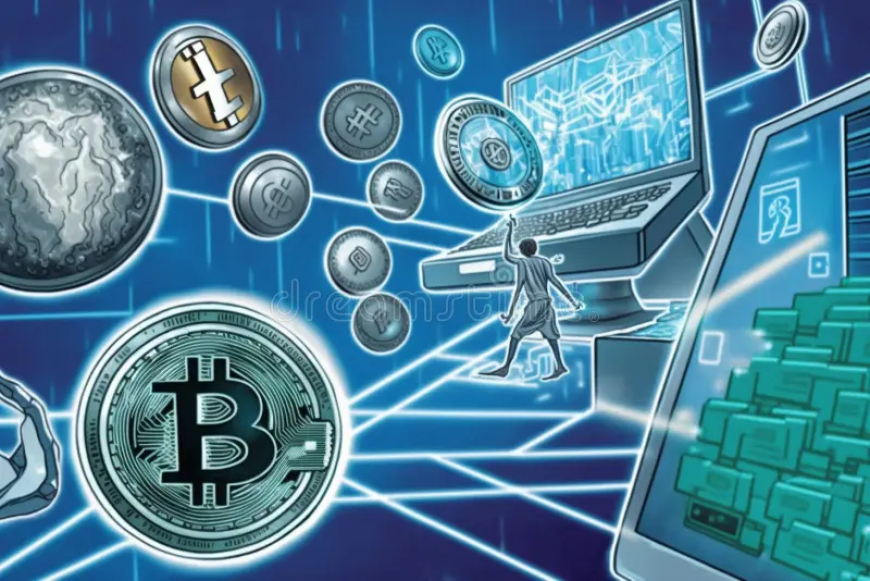The Future of Digital Currencies in a Libertarian World
Explore the transformative potential of digital currencies like Bitcoin in a libertarian society. Discover how these decentralized financial systems empower individuals, promote financial sovereignty, and challenge traditional fiat currencies.

Introduction
In a libertarian society where freedom from government intervention is paramount, digital currencies like Bitcoin could revolutionize our understanding of money and banking. Imagine a world where individuals have full control over their finances, conducting peer-to-peer transactions without intermediaries like banks or governments. This vision of financial sovereignty is not just a fantasy but a tangible possibility.
What is Libertarianism?

Libertarianism is a political philosophy advocating minimal government intervention and maximizing individual liberty, especially in economic matters. Libertarians favor a free market, personal responsibility, and voluntary cooperation. When applied to monetary policy, libertarianism supports a system free from central banks and government control. This ideology aligns well with digital currencies, which are decentralized and immune to government interference.
Digital Currencies: A Natural Fit for Libertarian Values

Digital currencies, built on blockchain technology, enable decentralized, peer-to-peer transactions. This aligns with libertarian ideals, as they reject centralized power. Bitcoin allows users to transfer value directly, giving individuals control over their wealth, free from government manipulation and inflation.
Problems with Traditional Fiat Currency
In a libertarian worldview, fiat currency presents significant issues:
- Government Control: Central banks manipulate the money supply, leading to inflation and economic instability.
- Surveillance: Fiat currencies enable governments to monitor and control financial transactions, infringing on personal freedoms.
The Evolution of Bitcoin and Other Cryptocurrencies

Bitcoin emerged after the 2008 financial crisis, addressing the lack of trust in centralized financial systems. Other cryptocurrencies, such as Ethereum and Ripple, have created a growing ecosystem of decentralized assets, further amplifying the appeal of digital currencies. The rise of Decentralized Finance (DeFi) offers financial products without traditional intermediaries, aligning with libertarian values.
Benefits of Digital Currencies in a Libertarian Society

Digital currencies provide several advantages:
- Financial Sovereignty: Individuals gain full control over their wealth without government regulations.
- Lower Fees: Peer-to-peer transactions eliminate bank fees, allowing for faster transfers.
- Transparency: Blockchain technology ensures accountability, reducing fraud risk.
Challenges Facing Digital Currencies

Despite their potential, digital currencies face hurdles:
- Volatility: Price fluctuations can undermine stability in a digital currency-driven economy.
- Security Risks: Cryptocurrencies are susceptible to hacking and fraud, requiring users to safeguard their assets.
- Public Perception: Overcoming skepticism regarding digital currencies is essential for broader adoption.
A Libertarian Economy with Digital Currencies
In a libertarian economy, digital currencies could replace central banks. The market would operate on supply and demand, with peer-to-peer transactions supported by smart contracts, facilitating agreements without intermediaries. This shift would require a high level of technological literacy and trust in decentralized systems.
Bitcoin as a Hedge Against Inflation
Bitcoin's limited supply makes it an effective hedge against inflation. Unlike fiat currencies that can be printed at will, Bitcoin's scarcity protects individuals from government-induced inflation. Its decentralized nature ensures that no single entity can manipulate its value.
Smart Contracts and DeFi in a Libertarian Economy
Smart contracts automate agreements on the blockchain, removing the need for intermediaries. Decentralized Finance platforms empower individuals to control their financial decisions, reducing reliance on traditional institutions.
Potential for Increased Privacy and Financial Freedom

Digital currencies enhance privacy, allowing for pseudonymous transactions that escape government surveillance. Privacy coins, like Monero, enable users to conduct transactions discreetly, a core principle for libertarians.
Conclusion
The path forward for digital currencies in a libertarian world is promising yet challenging. Digital currencies could lead to unprecedented financial freedom, but issues like volatility and security need addressing. Ultimately, the future of money may hinge on balancing innovation with individual liberties in a rapidly changing economic landscape.
FAQs
-
How Could Digital Currencies Eliminate Government Control?
By enabling peer-to-peer transactions, digital currencies minimize reliance on centralized banks, giving individuals control over their finances. -
What Makes Bitcoin So Appealing to Libertarians?
Bitcoin embodies decentralization and autonomy, protecting individuals from government manipulation and inflation. -
Can Digital Currencies Fully Replace Traditional Money?
While possible, factors like public trust and regulatory frameworks will play critical roles in this transition. -
How Would a Decentralized Economy Impact Everyday Transactions?
Transactions could become faster, cheaper, and more secure, with individuals conducting business directly. -
Are There Risks in Using Digital Currencies?
Yes, risks include volatility, security threats, and challenges related to public perception.
What's Your Reaction?


















































